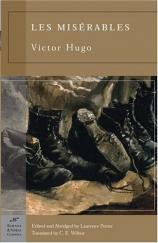Les Misérables
About the Book
Les Misérables
Les Misérables, translated variously from the French as The Miserable Ones, (The Wretched, The Poor Ones, The Wretched Poor, or The Victims), is an 1862 French novel by author Victor Hugo and is widely considered one of the greatest novels of the nineteenth century. It follows the lives and interactions of several French characters over a seventeen-year period in the early nineteenth century, starting in 1815 and culminating in the 1832 June Rebellion.
The novel focuses on the struggles of ex-convict Jean Valjean and his experience of redemption. It examines the nature of law and grace, and expatiates upon the history of France, architecture of Paris, politics, moral philosophy, antimonarchism, justice, religion, and the types and nature of romantic and familial love. The story is historical fiction because it contains factual and historic events. Contrary to what some believe, it does not use the French Revolution as a backdrop. The French Revolution took place in the eighteenth century; Les Miserables takes place in the nineteenth. The only "revolution" depicted is the June Rebellion, a student uprising.
Les Misérables contains many plots, but the main thread is the story of ex-convict, Jean Valjean (known by his prison number, 24601), who becomes a force for good in the world, but cannot escape his dark past. The novel is divided into five volumes, each volume divided into books, and subdivided into chapters (for a total of three hundred sixty-five chapters). Each chapter is relatively short, usually no longer than a few pages. Nevertheless, the novel as a whole is quite lengthy by modern standards, exceeding fourteen hundred pages in unabridged editions (nineteen hundred pages in French). It also contains what has many times, incorrectly, been considered the longest sentence in a published novel. Within the borders of the novel's story, Hugo fills many pages with his thoughts on religion, politics, and society, including several lengthy digressions, one being a discussion on enclosed religious orders, one on the construction of the Paris sewers, another being on argot, and most famously, his retelling of the Battle of Waterloo.




